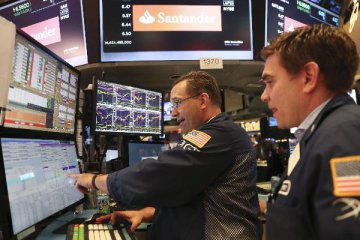NEW YORK, June 25 (Xinhua) -- All three major U.S. indices declined on Tuesday as the market was disappointed at Federal Reserve Chairman Jerome Powell's remarks on the central bank's possible monetary policy moves as well as weaker-than expected economic data.
The Dow closed 0.67 percent lower, notching its biggest one-day loss since May 31. The S&P 500 lost 0.95 percent while the Nasdaq Composite registered 3-day losing streak, dropping 1.51 percent.
Talking about the central bank's future monetary policy move during an event held by the Council on Foreign Relations in New York on Tuesday, Powell admitted that he and his colleagues have been grappling with the question that "whether these uncertainties will continue to weigh on the outlook and thus call for additional policy accommodation."
He said many Federal Open Market Committee (FOMC) participants judge that "the case for somewhat more accommodative policy has strengthened."
But he also warned that monetary policy should not overreact to any individual data point or short-term swing in sentiment.
The remarks led to negative sentiment for the market as they dampened the market enthusiasm of a more aggressive rate cut plan.
Market expectations for a rate cut now stands at 100 percent, with 70.8 percent chance of a cut of 25 basis points, according to the CME Group's FedWatch tool.
Trade uncertainties have clearly weighed on consumer confidence, as an index by a business research group showed on Tuesday.
The Conference Board's consumer confidence index, a key measure of the U.S. economy, slipped to 121.5 in June, the lowest since September 2017. The May reading was downwardly revised to 131.3.
The group's present situation index, which is based on consumers' assessment of current business and labor market conditions, decreased from 170.7 to 162.6. The decrease was driven by a less favorable assessment of business and labor market conditions.
The expectations index, which is based on consumers' short-term outlook for income, business and labor market conditions, decreased from 105.0 last month to 94.1 this month.
Lynn Franco, senior director of economic indicators at The Conference Board, said in a statement that the escalation in trade and tariff tensions earlier this month appears to have shaken consumers' confidence.
"Although the Index remains at a high level, continued uncertainty could result in further volatility in the Index and, at some point, could even begin to diminish consumers' confidence in the expansion," said Franco.
"It is the first real sign that the recent weakness in the incoming activity data is now spreading to consumers," said Michael Pearce, senior U.S. economist at Capital Economics, in a note.
He said while the fundamentals for consumption growth still appear solid overall, consumption growth will be slowing if the rest of the economy is rapidly losing momentum and taking the jobs market with it.
"If the incoming data continue to deteriorate markedly, the Fed will begin cutting rates, potentially as soon as the July meeting," he said.



















Latest comments